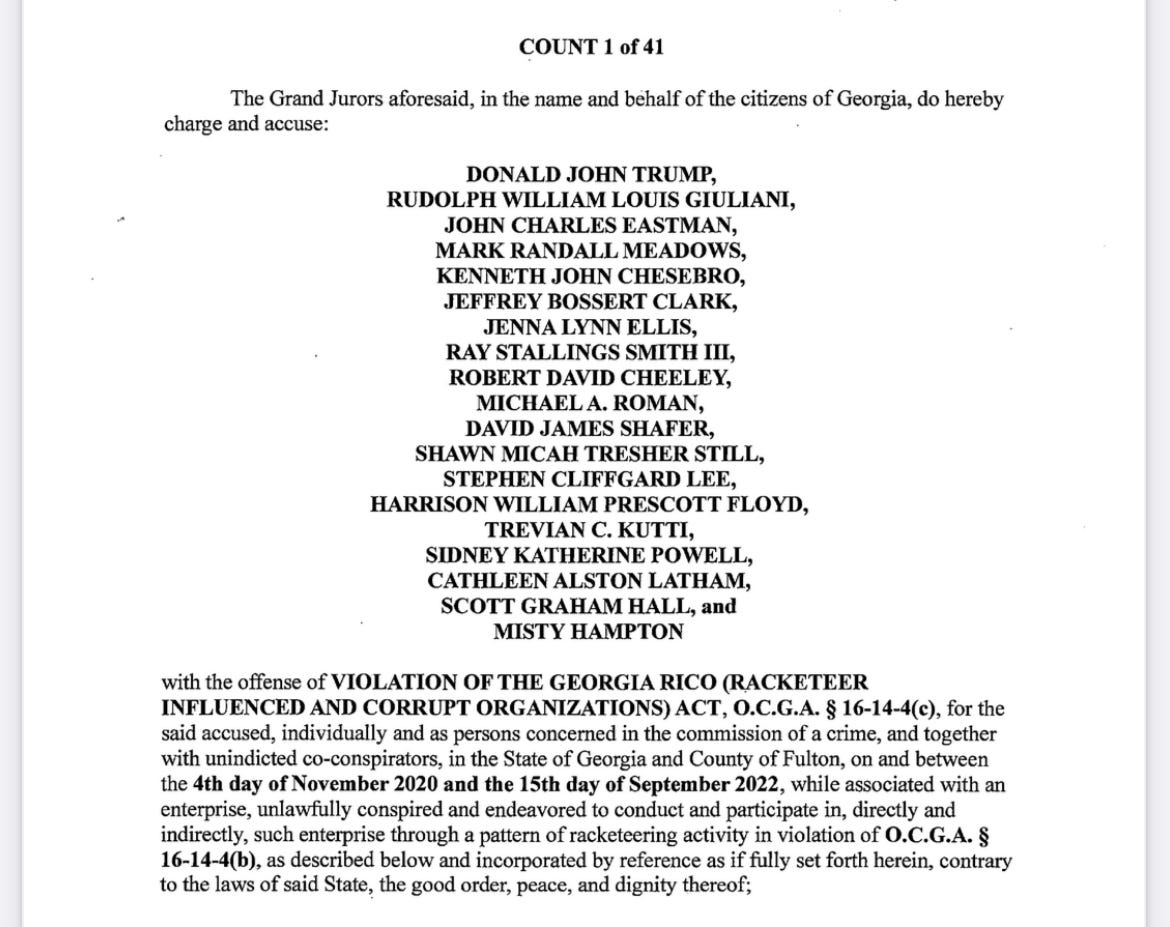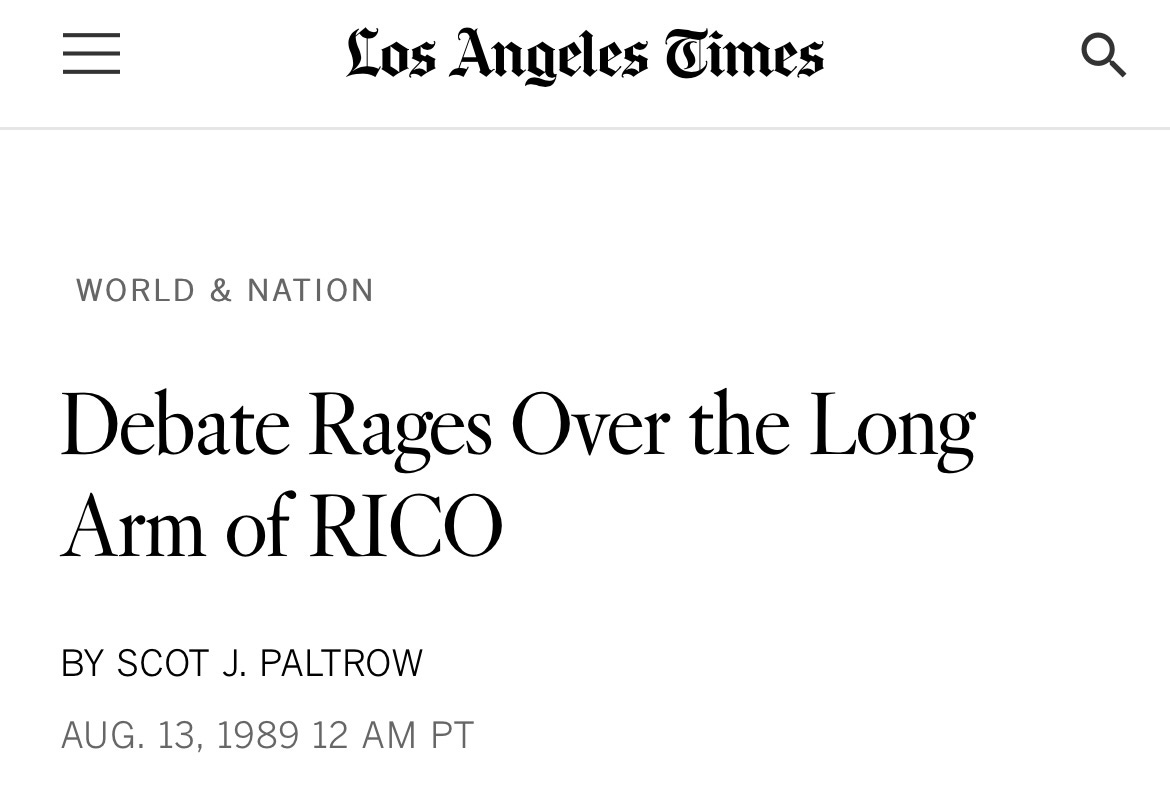On the insanity of the Georgia indictment against Donald Trump
Guest Post by Alex Berenson
Donald John Trump is in trouble. The country is in even more.
The bizarre legal martyrdom of Donald Trump entered a new phase Monday night.
The new indictment of Trump – and 18 other defendants – in Fulton County, Georgia overreaches absurdly both on legal theory and the facts it offers to back the charges.
It tries to criminalize speech, including public statements. It pretends a random array of events, many of which did not even involve Georgia, make a criminal conspiracy. Among the “overt acts” it includes is a text message from Trump’s chief of staff asking for the phone numbers of two Pennsylvania legislators.
Yes, that’s the entire “act.” No, I’m not making this up. I wish I were.
The indictment is a stunning abuse of prosecutorial discretion, made worse because federal prosecutors brought an indictment covering similar ground two weeks ago.
Yet if the indictment is a joke, its stakes could not be higher. It risks throwing the 2024 election into chaos and inciting political and societal disorder even more than Trump’s other indictments.
The Fulton County indictment of Trump is astonishing in its breadth. It covers 41 charges and 19 separate defendants, including Mark Meadows, Trump’s chief of staff in 2020.
—
(Oh my, what a big conspiracy you have!)

(SOURCE)
—
At the core of the prosecution are RICO – “Rackeeter Influenced and Corrupt Organization” charges against all 19 defendants. The fact that Fani T. Willis, the Fulton County district attorney, is using RICO is no surprise, as no law can be abused by prosecutors more easily, except maybe civil forfeiture statues.
Congress passed the first RICO statute in October 1970. Originally aimed at the Mafia, RICO lets prosecutors attack criminal organizations whose leaders profit without directing footsoldiers to commit specific crimes. (Just make sure he pays, huh?)
RICO lets prosecutors hold the defendants in a criminal enterprise liable for each other’s crimes, even if different conspirators committed them at different times. Members do not even have to meet each other. Essentially, the statute criminalizes guilt by association.
Thirty-three states, including Georgia, have now passed similar laws.
But both the original federal statute and the state laws that followed did not require violence as an element of the conspiracies. Thus prosecutors quickly began to use RICO laws to target not just the Mafia, but corporate crime too.
White-collar defendants complained they were facing long sentences for non-violent behavior that in some cases had previously faced only civil sanction. As the Los Angeles Times wrote in 1989:
An increasing number of legal scholars, some of them former prosecutors, contend that the law is so vaguely worded that almost any federal offense involving more than one violation of the law can be cast as a racketeering case.
Stephen Gillers, a law professor at New York University, says: “I believe that looked at nakedly, the RICO statute gives the prosecutor too much power.”

—
But Congress and state legislatures were – and have remained – unsympathetic to these complaints.
Recently, aggressive prosecutors have expanded the statute’s use even further. In a 2021 article about RICO’s growing use, The Wall Street Journal noted:
“Federal prosecutors have become more enamored with the RICO law’s ability to expand the story,” said James Trusty, former chief of the U.S. Justice Department’s Organized Crime and Gang division in Washington, D.C. Mr. Trusty said the statute effectively broadens what is considered criminal behavior under federal law and what is admissible in court.
—
Perhaps no prosecutor is more enamored with RICO’s powers than Fulton County’s Fani Willis. In 2015, Willis used RICO to prosecute Atlanta teachers who had inflated children’s test scores. Eleven teachers were ultimately found guilty.
Now Willis has set her sights on Donald Trump for his decision to contest the 2020 election – and the people around him who encouraged him and offered him strategies to do so.
As I have said many times before (and as I know many of you do not like hearing), Trump unequivocally lost in 2020 on both a popular vote and electoral vote basis. His decision not to accept the results of the election quickly was bad for our democracy. And his unwillingness to condemn the violence at the Capitol and encourage a peaceful transfer of power on Jan. 6 will stain him forever.
But.
But Trump’s complaints about the election were legal, protected speech. Even Jack Smith’s federal indictment makes that clear:
The Defendant had a right, like every American, to speak publicly about the election and even to claim, falsely, that there had been outcome-determinative fraud during the election andthat he had won . He was also entitled to formally challenge the results ofthe election through lawful and appropriate means, such as by seeking recounts or audits of the popular vote in states or filing lawsuits challenging ballots and procedures.
The Georgia indictment takes no account of the First Amendment rights of Trump – or anyone else. In fact, it goes the other way. It enumerates 161 “acts” making up the alleged conspiracy.
The first is Trump’s speech on Nov. 4, 2020 “falsely declaring victory in the 2020 presidential election.”
Yes, Willis is trying to criminalize the act of a political candidate claiming to have won an election.
—
The rest of the indictment is just as bad.
Many of the “overt acts” that Willis alleges were part of the conspiracy consist of efforts that the defendants made in Wisconsin and other states and have no plausible connection to Georgia.
Then there’s “Act 6,” the moment when Mark Meadows, Trump’s chief of staff, asks a Republican Congressman to pass along the phone numbers of two members of the Pennsylvania legislature. That’s it. That’s the entire “overt act in furtherance of the conspiracy.”
—
(Just gimme the phone number and nobody gets hurt)

(SOURCE)
—
So, yes, Willis is stretching an already problematic legal theory to its limits.
For his entire career, Trump has dodged legal trouble. This indictment may seem like yet another trap he’s going to escape.
But here’s the thing.
He may not. Willis won in the cheating case. She convinced jurors to view changing student answers on tests as a criminal conspiracy. And she will have a very favorable jury pool to try Trump. Fulton County consists of the city of Atlanta and some of its suburbs and voted 73-26 for Biden in 2020.
Further, Willis has said she wants to try the case in six months, as the Republican primaries are beginning. By itself, that will hamper Trump from campaigning, though he is so far ahead of Ron DeSantis and other challengers for the Republican nomination his absence may not matter.
But if she wins, if she convicts Trump, he will go to prison. In Georgia, RICO charges carry minimum sentences of five years. And as commentators from both parties have pointed out, even Georgia’s Republican governor will not be able to pardon him. Only the state parole board can do so, and not until after his sentence is complete.
The Constitution does not bar Trump from being elected President. But, obviously, as a prisoner, Trump would face huge obstacles campaigning for President next summer and fall. He depends on his live rallies to rile and rally supporters and his ability to use the Internet to win publicity for himself. He will lack both those weapons.
This dynamic will be obvious from the moment Trump is imprisoned, should he be convicted. Both the fact of his imprisonment for criticizing of the 2020 election results and his inability to campaign will infuriate his core supporters. (If he does win the Presidency, I have no idea what will happen, but presumably Georgia will face pressure to change its parole laws to allow him to live in the White House as President.)
Trump is about as far as anyone can imagine from a sympathetic character.
But if he is convicted of and imprisoned on these charges before Election Day, a huge number of Americans will view him as a political prisoner. And if he loses, they will blame his imprisonment for that loss.
Congratulations, Alvin Bragg, Jack Smith, and especially Fani Willis. You are halfway to the most unthinkable magic trick of all time: turning Donald Trump into Nelson Mandela.
Administrator The Burning Platform https://www.theburningplatform.com/
Comments
Post a Comment